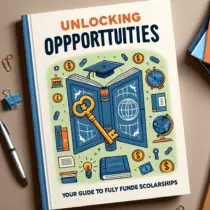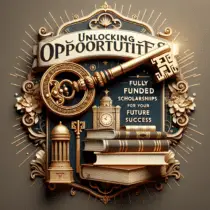Education is a powerful tool that can shape one’s future, but the cost of higher education can be a significant barrier for many students. Fortunately, fully funded scholarships offer a beacon of hope, providing an opportunity to pursue academic dreams without the burden of financial strain. This guide aims to simplify the process of finding and applying for these scholarships, helping students unlock doors to their future.
Understanding Fully Funded Scholarships
Fully funded scholarships cover all expenses related to education. This includes tuition fees, living expenses, travel costs, books, and sometimes even health insurance. These scholarships are typically awarded based on various criteria such as academic excellence, leadership qualities, community service, or specific talents.
Types of Fully Funded Scholarships
There are several types of fully funded scholarships available for different categories of students:
- Merit-Based Scholarships: Awarded based on academic or other achievements.
- Need-Based Scholarships: Given based on financial need.
- Subject-Specific Scholarships: Targeted at students pursuing particular fields of study.
- Destination-Specific Scholarships: Offered by governments or institutions in specific countries.
- Student-Specific Scholarships: Designed for certain groups like minorities or first-generation college students.
Where to Find Fully Funded Scholarships
Finding fully funded scholarships requires thorough research and persistence. Here are some reliable sources:
- University Websites: Many universities offer their own fully funded scholarship programs.
- Government Programs: Governments often provide scholarships for both domestic and international students.
- Non-Profit Organizations: Numerous non-profits offer scholarships based on various criteria.
- Online Scholarship Databases: Websites like Fastweb, Scholarship.com, and others compile lists of available scholarships.
Popular Fully Funded Scholarship Programs
Some well-known fully funded scholarship programs include:
- Fulbright Program (USA): Offers opportunities for international study/research in about 140 countries.
- Chevening Scholarships (UK): Government-funded scholarships covering all expenses for one-year master’s programs in the UK.
- Erasmus Mundus (EU): Provides funding for joint master’s degrees across European universities.
- DAAD Scholarships (Germany): German Academic Exchange Service offers funding for various degrees in Germany.
Eligibility Criteria
Eligibility criteria vary widely depending on the scholarship program:
- Academic Record: High grades are often required.
- Language Proficiency: Proof of proficiency in the language of instruction might be needed (e.g., TOEFL/IELTS).
- Extracurricular Activities: Participation in extracurricular activities is sometimes necessary.
- Specific Backgrounds or Fields: Some scholarships target specific nationalities or fields of study.
The Application Process
The application process for fully funded scholarships can be competitive and rigorous, but understanding each step can make it more manageable:
- Research Thoroughly: Start early to find suitable scholarships that match your profile.
- Prepare Documents: Gather necessary documents such as transcripts, letters of recommendation, personal statements, resumes/CVs.
- Meet Deadlines: Keep track of application deadlines as missing them could disqualify you immediately.
- Write a Strong Personal Statement: Clearly articulate your goals and how the scholarship will help achieve them.
- Seek Recommendations: Obtain strong letters from teachers/professors who know you well academically and personally.
- Submit Applications: Ensure all parts are completed correctly before submitting your applications online or via mail as required.
- Interview Preparation: Some programs may require an interview phase; prepare by practicing common questions and researching the institution/program thoroughly.
Tips for Success
- Start Early: Begin your search at least a year before you plan to attend school since applications can take time to complete properly.
- Stay Organized: Use spreadsheets or calendar reminders so important dates and details don’t slip through the cracks.
- Tailor Each Application: Customize personal statements and resumes specifically towards each individual program instead of using generic submissions.
- Highlight Uniqueness: Showcase unique experiences and qualities that set you apart from other candidates, making a memorable impression on evaluators.
- Proofread Thoroughly: Ensure everything is error-free beyond simple spell checks – clear grammar, content, and messages matter greatly in reviewers’ eyes.
- Seek Assistance if Needed: Don’t hesitate to ask teachers, counselors, friends, or family to review, edit, and help refine your applications, improving the overall quality of submitted work.
Common Mistakes to Avoid
Avoid these common mistakes to increase your chances of success:
- Missing Deadlines: Late applications are rarely considered.
- Incomplete Applications: Ensure all required documents are submitted.
- Generic Submissions: Tailor each application to the specific scholarship.
- Ignoring Instructions: Follow the application guidelines carefully.
- Poorly Written Personal Statements: Write clear, concise, and compelling essays.
- Weak Recommendations: Choose recommenders who know you well and can provide strong, detailed letters.
Conclusion
Securing a fully funded scholarship can transform your educational journey, allowing you to focus on your studies without financial worries. By understanding the types of scholarships available, knowing where to find them, and carefully preparing your applications, you can unlock opportunities for a brighter future. Start your search today and take the first step towards achieving your academic and professional goals.






